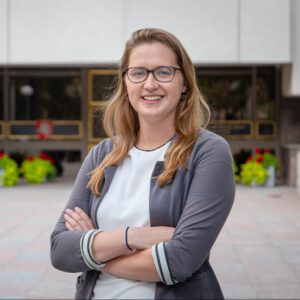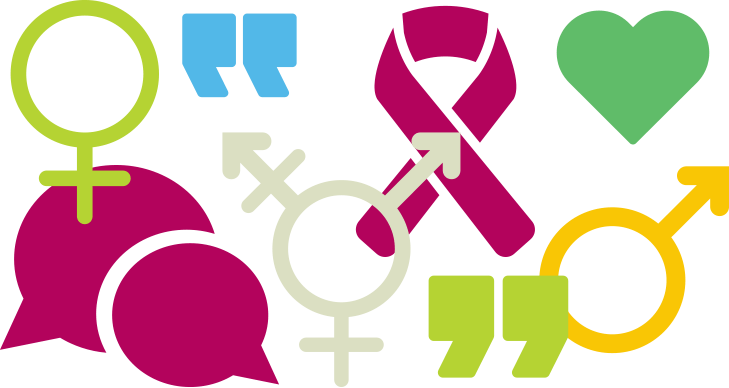Do you wish to know more about sexual and reproductive health in Lithuania? How services are currently affected by Covid-19? And how access to quality comprehensive sexuality education and sexual and reproductive health services can be improved? In this article, Nika Norvila (she/her/hers), a Native New Yorker, sexuality educator, and second-generation Lithuanian-American, shares her journey of advocating for SRHR. She also discusses the journey and results of a project in the country of her grandparents, to strengthen sexuality education in a conservative Lithuania.
I am a New York City born and raised Lithuanian-American. While I grew up in New York City, Lithuanian culture and language were always an important aspect of my life. I am a rare case second or third (depending on how you count) generation American, who still speaks Lithuanian. My grandparents fled Lithuania during World War II. My parents raised my siblings and I to speak Lithuanian at home. We attended Lithuanian school on Saturdays, Lithuanian Church, and Lithuanian camps in Vermont and Massachusetts.
While studying my sociology undergrad, I became particularly interested in gender inequalities, sexual double standards, and women’s domestic labor and global migration patterns. These interests led me to pursue a master’s degree in Amsterdam, where I conducted qualitative research on the intersections of sex work, human trafficking, migration from Eastern Europe to the Netherlands, and sexuality. After finishing this research, I contributed to the Red Umbrella Fund’s participatory grantmaking model to fundraise and support sex worker-led organizations fighting for the decriminalization of sex work, access to healthcare, and policies that ensured the safety of sex workers globally.
'My colleague and I noticed the lack of inclusion of sexual pleasure in our state-mandated curriculum, even though sexual pleasure is one of the primary reasons humans have sex.'
Upon returning home to New York City, I worked as a sexuality educator in NYC public schools. I facilitated an HIV/STI/pregnancy prevention program, provided one-on-one reproductive health counseling, and created and coordinated additional youth development programs to improve young people’s healthy decision-making skills. My colleague and I noticed the lack of inclusion of sexual pleasure in our state-mandated curriculum, even though sexual pleasure is one of the primary reasons humans have sex. This led me to conduct research using multiple methods, and we created and trialed new activities on consent, communication, and sexual pleasure. Our research showed that including sexual pleasure and activities on communicating sexual pleasure with partners is linked to increased consensual sexual behavior. I presented these findings and sample activities to an audience of 90 participants at the National Sex Ed conference in April of 2019.
Meanwhile, my personal itch to live and contribute to Lithuanian society was not going away. I had spent summers as a teenager, and a summer internship in college, in Lithuania, but I had never lived there even though being Lithuanian is such an important part of my identity. During the summer of 2019, I decided to take the leap. I combined my skills and passions with my personal connection and family history and moved to Lithuania. I was accepted to the ‘Create Lithuania’ program, which is a highly selective leadership program for Lithuanians to apply best foreign practices to create change by conducting two six-month projects in the public sector.
Sexuality and thus, sexuality education, is still a very controversial topic in many countries in the world, including Lithuania. Due to the silence around the topics of sexuality and sex under the Soviet Union, and the strong political influence of the Catholic church, only small strides have been made in the area of sexuality education in schools over the years. I managed a project to strengthen sexuality education at Lithuania’s Youth Affairs Department under the Ministry of Social Security and Labor.
'Sexuality and thus, sexuality education, is still a very controversial topic in many countries in the world, including Lithuania.'
According to WHO, UNICEF, UNESCO, UNAIDS, UNWomen, UNFPA, and the European Commission, sexuality education programs (and lack thereof) impact the following indicators: gender equality, violence against women and intimate partner violence, HIV and STI rates, LGBTQ+ bullying and discrimination, and teenage pregnancy. Lithuania’s indicators are all lower than the EU average across the board and Lithuania has the highest rates of LGBT+ bullying and discrimination in the EU.
I decided to strengthen sexuality education through Lithuania’s informal education sector. There are over 100 youth centers and spaces across Lithuania, many of which work to serve as a space to learn, grow, and feel safe. These centers serve all youth ages 14-29, with a particular emphasis on including youth from disadvantaged homes. Typically, youth workers have a close relationship with young people, act as their mentors, and often end up answering sexuality-related questions. Youth workers are in a position to make a meaningful impact on the lives of youth, they just need support: they need the resources and training to feel more confident and capable to engage youth in sexuality education-related activities, and resources to refer them to additional services. To address these gaps, I wrote a sexuality education practical guide aimed at strengthening the capabilities of youth workers, as well as social workers, public health workers, and other professionals working with youth.
After joining the Youth Affairs Department as a Program Manager, in addition to my primary responsibilities, I continued to advocate for, and develop sexuality education policy. In collaboration with the Ministries of Health and Education, I coordinated the process to include sexuality education and expansion of youth-friendly sexual and reproductive health services in the Ministry of Social Security and Labor’s Family development program. Once approved, this program will provide funding to train youth professionals in sexuality education and will give health professionals additional funding to make sexual and reproductive health services more accessible to youth. The inter-institutional collaboration will ensure the joint continuity of programs and services across the formal and informal education sectors and the health sectors.
'Youth and sexual and reproductive health services do not often fall into a sentence together.'
Like everywhere else, the COVID-19 global pandemic has affected all sectors in Lithuania. Schools have been back and forth between virtual and in-person formats for the past year. Youth centers follow specific guidelines on how and when they are allowed to operate. In the heat of the pandemic this winter, youth centers primarily operated virtually, with hopes of returning to some in-person activities this spring, or when contagion rates fall. It is difficult to measure and to clearly see how this pandemic affected youth access to sexual and reproductive health services because there is not one single national agency that monitors or measures this. Youth and sexual and reproductive health services do not often fall into a sentence together. Young people in Lithuania didn’t have easy access to sexual and reproductive health services due to stigma, parental consent requirements, and personal biases of doctors and pharmacists. The current global pandemic could have only increased the already existing barriers to these crucial healthcare services. Additionally, many resources in the health and education sectors were shifted to covid-19, thus not prioritizing the sexual and reproductive health needs of young people.
There are several organizations that have been working to promote comprehensive sexuality education in Lithuania. They continue to work even as they are attacked and challenged by other organizations. Įvairovės ir edukacijos namai conducts training for parents, teachers, youth workers, and social workers. Upon requests, they visit schools and other youth organizations to facilitate seminars on various sexuality education topics. They are one of the few organizations that work to promote comprehensive sexuality education policy, conduct training, and work with young people across Lithuania. Additionally, they publish articles and recommendations and use social media to reach and address young people’s concerns.
Other organizations that work with sexuality education, LGBT rights, sexual and reproductive health are:
– LGL- National LGBT Rights Organization
– Lietuvos Žmogaus teisių centras (Lithuania’s human rights center)
– Demetra
– Family Planning and Sexual Health Association
Although several essential steps have been made to increase youth access to quality comprehensive sexuality education and sexual and reproductive health services, there is a lot that still needs to be done. The following lists but a few of the necessary policy, legal and funding to continue to promote the expansion of sexuality education, and sexual and reproductive health services and rights for young people:
– Approval of development program which will provide funding to train youth workers, educators, public health workers, and other professionals working with youth and funding for youth programs to include sexuality education.
– Governmental policies supporting LGBT human rights, including discrimination protections, and the right to marriage.
– Accredited training program for sexuality educators to work in school.
– Increased youth access to SRHR including, self consent (parental consent not necessary) for all SRH services from age 13/14.
– Access to free condoms and free (or low cost) LARC (long-acting reproductive contraceptive methods). There is a long way to go – not just in Lithuania, but worldwide – to achieve access to youth (and adult) sexuality education and services.

About the author: Nika Norvila is a sexuality educator and SRHR advocate. Nika has a Master’s degree in Sociology, track in gender, sexuality and society. Nika worked as sexuality educator in NYC public schools, facilitating STI, HIV and pregnancy prevention programing to youth ages 11-19. Nika managed a project in Lithuania’s public sector to strengthen sexuality education. She wrote a sexuality education practical guide, and advocated for the inclusion of sexuality education and expansion of youth accessible SRH services in Lithuania. Nika is currently based in NYC, and recently joined the Stories to Action team as a Fundraising Manager.
We make youth voices count!
We gather stories and real-time insights and use this for our advocacy with governments, international institutions (like the United Nations),
and donors.
